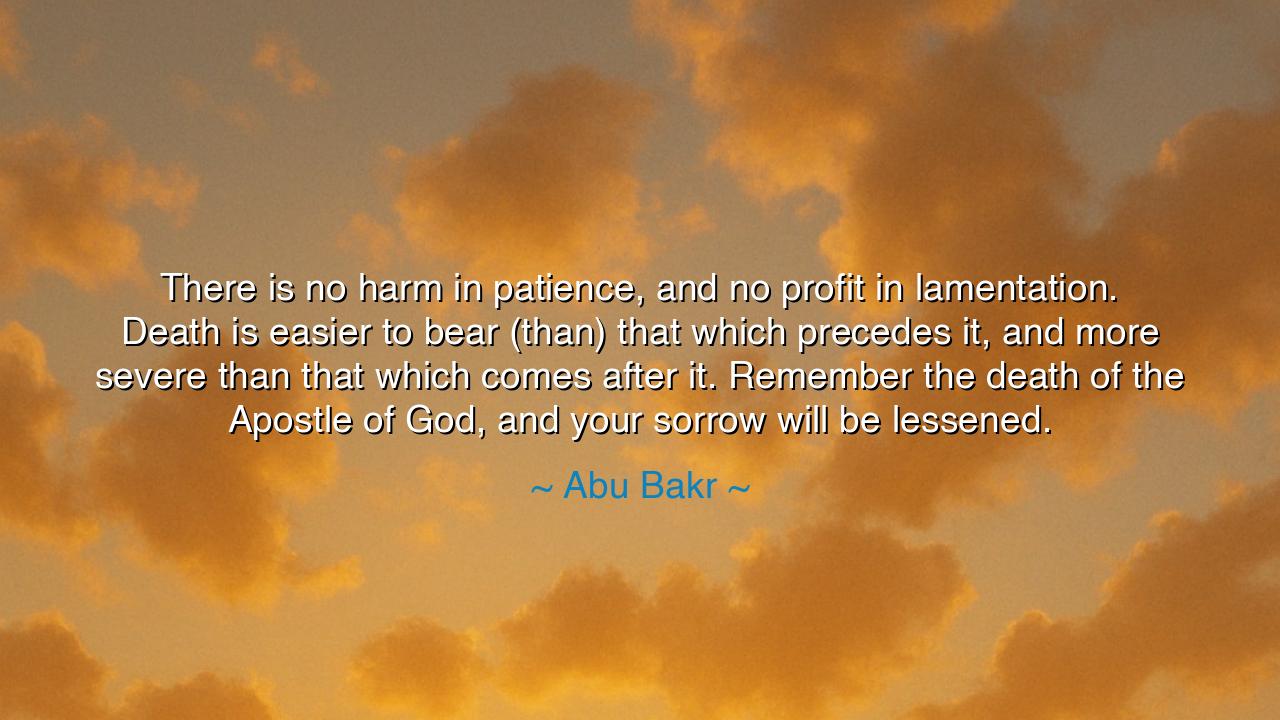
There is no harm in patience, and no profit in lamentation. Death
There is no harm in patience, and no profit in lamentation. Death is easier to bear (than) that which precedes it, and more severe than that which comes after it. Remember the death of the Apostle of God, and your sorrow will be lessened.






The words of Abu Bakr — “There is no harm in patience, and no profit in lamentation. Death is easier to bear (than) that which precedes it, and more severe than that which comes after it. Remember the death of the Apostle of God, and your sorrow will be lessened.” — are a river of wisdom flowing from one of the purest hearts of the early age. Spoken in the shadow of the Prophet Muhammad’s passing, these words carry the stillness of acceptance and the light of faith. They were born not from philosophy alone, but from deep grief — the kind that tests the soul’s very foundation. In this moment of loss, Abu Bakr, the first Caliph of Islam and one of the Prophet’s closest companions, reminded the believers that sorrow is natural, but patience is divine.
When the Prophet of God, peace be upon him, departed from this world, the city of Medina trembled with grief. Many could not believe what had happened. Some said he was not dead, that he had only gone to his Lord and would return. The people wept in disbelief and despair. Even the mighty Umar ibn al-Khattab, known for his strength and courage, drew his sword and declared that anyone who said the Prophet had died would face his wrath. It was then that Abu Bakr, calm though his heart was breaking, stood before the people and spoke these words. He reminded them that the Prophet was mortal, that death spares no man — not even the beloved of God. “Whoever worships Muhammad,” he said, “know that Muhammad is dead. But whoever worships Allah, know that Allah is Ever-Living, never to die.”
In that moment, his voice became the anchor of a nation drowning in grief. The people fell silent, and the truth of his words settled upon their hearts. His saying, “There is no harm in patience, and no profit in lamentation,” is not a command to suppress emotion, but a guide toward balance. Lamentation, the endless wailing over what cannot be changed, offers no healing — it traps the soul in despair. But patience, born of faith, transforms suffering into strength. To endure with dignity is not to deny pain, but to walk through it with trust in the wisdom of God.
When he says, “Death is easier to bear than that which precedes it, and more severe than that which comes after it,” Abu Bakr reveals the paradox of human suffering. The approach of death — with its fears, its uncertainty, its slow separation from the world — is heavier to endure than the moment of death itself. For when the soul departs, it is freed from the struggle of the body, from the weight of longing and attachment. And beyond death lies not punishment for the faithful, but peace — the meeting with the Divine, the reunion with truth. Thus, he teaches that while death brings pain to the living, it also brings release to the departed, and this understanding should lessen our despair.
And when he concludes, “Remember the death of the Apostle of God, and your sorrow will be lessened,” his meaning is profound. If the most perfect of creation — the Messenger of God — could pass from this world, how can any of us hope to escape that fate? His death was the greatest loss, yet the community endured, strengthened by remembrance of his teachings. In recalling that even the beloved Prophet faced death with serenity, Abu Bakr called upon every believer to find solace in faith rather than despair in loss. For grief is eased when the heart aligns with truth, and the truth is this: that all who live must die, and all who die return to the mercy of the One who created them.
From this ancient moment of sorrow, we learn a timeless lesson. Patience is not weakness; it is the armor of the soul. It does not mean the absence of tears, but the presence of faith. Lamentation, on the other hand, is the rebellion of the heart against the inevitable — and it leaves us empty. To bear hardship with grace, to face death with calm, to surrender loss to God’s will — these are the marks of spiritual maturity. The wise man does not waste his strength fighting what cannot be undone; he spends it seeking understanding, compassion, and peace.
So, my children, remember the words of Abu Bakr when sorrow visits you. When death takes one you love, or when hardship grips your days, do not drown in despair. Let your tears fall, but let your faith stand. Be patient, for patience is a bridge over the fire of grief. Do not lament endlessly, for lamentation feeds only the darkness within. And when your heart feels crushed beneath loss, remember those who bore greater trials before you, and how they rose again through remembrance of God. For death is not the end — it is a doorway. And if even the Prophet of God passed through it in peace, then surely you too can walk that path with courage, knowing that what lies beyond is not the void, but the eternal light of reunion.






AAdministratorAdministrator
Welcome, honored guests. Please leave a comment, we will respond soon